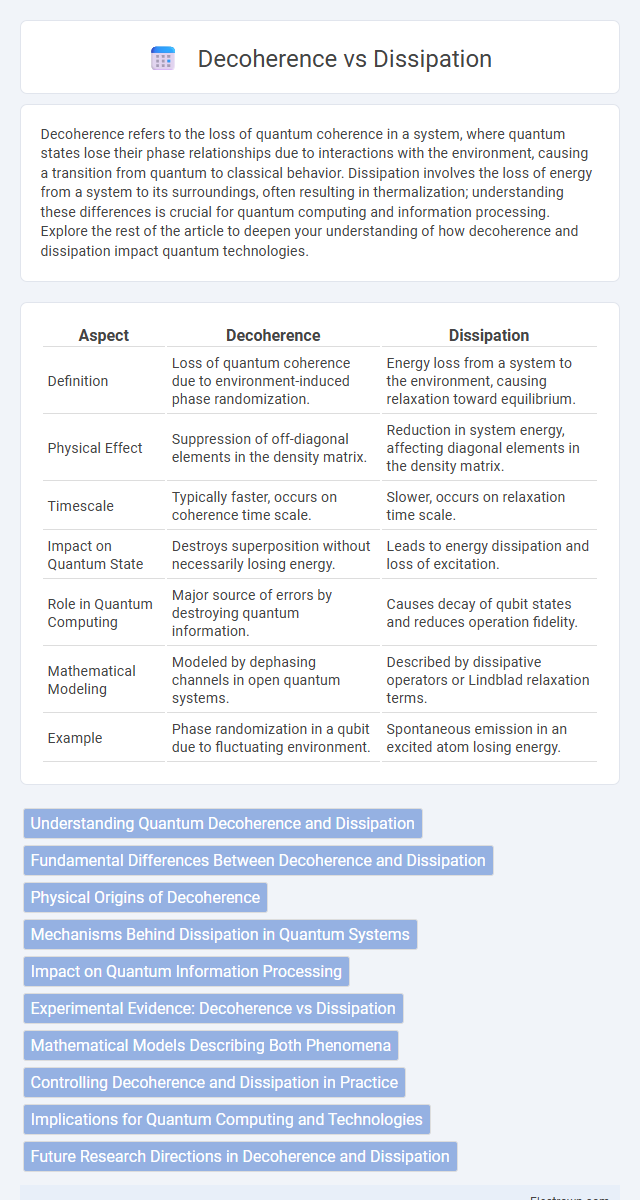Decoherence refers to the loss of quantum coherence in a system, where quantum states lose their phase relationships due to interactions with the environment, causing a transition from quantum to classical behavior. Dissipation involves the loss of energy from a system to its surroundings, often resulting in thermalization; understanding these differences is crucial for quantum computing and information processing. Explore the rest of the article to deepen your understanding of how decoherence and dissipation impact quantum technologies.
Table of Comparison
| Aspect | Decoherence | Dissipation |
|---|---|---|
| Definition | Loss of quantum coherence due to environment-induced phase randomization. | Energy loss from a system to the environment, causing relaxation toward equilibrium. |
| Physical Effect | Suppression of off-diagonal elements in the density matrix. | Reduction in system energy, affecting diagonal elements in the density matrix. |
| Timescale | Typically faster, occurs on coherence time scale. | Slower, occurs on relaxation time scale. |
| Impact on Quantum State | Destroys superposition without necessarily losing energy. | Leads to energy dissipation and loss of excitation. |
| Role in Quantum Computing | Major source of errors by destroying quantum information. | Causes decay of qubit states and reduces operation fidelity. |
| Mathematical Modeling | Modeled by dephasing channels in open quantum systems. | Described by dissipative operators or Lindblad relaxation terms. |
| Example | Phase randomization in a qubit due to fluctuating environment. | Spontaneous emission in an excited atom losing energy. |
Understanding Quantum Decoherence and Dissipation
Quantum decoherence occurs when a system's quantum states lose coherence due to interactions with the environment, causing the loss of superposition without energy exchange. Dissipation involves energy transfer from the quantum system to its surroundings, leading to thermalization and energy relaxation. Understanding these distinct processes is crucial for developing stable quantum computing and preserving quantum information.
Fundamental Differences Between Decoherence and Dissipation
Decoherence refers to the loss of quantum coherence caused by the entanglement of a system with its environment, leading to the suppression of interference effects without energy exchange. Dissipation involves the irreversible transfer of energy from the system to the environment, resulting in thermalization and relaxation to equilibrium. Unlike dissipation, decoherence primarily addresses the destruction of quantum superpositions, while dissipation concerns the system's energy dynamics and entropy increase.
Physical Origins of Decoherence
Decoherence arises from the interaction between a quantum system and its environment, causing the loss of quantum coherence without necessarily exchanging energy, whereas dissipation involves energy transfer leading to thermalization. The physical origins of decoherence include environmental noise, scattering processes, and entanglement with uncontrollable external degrees of freedom, which disrupt the phase relationships needed for superposition. Understanding these mechanisms helps you design quantum systems that minimize decoherence effects and preserve quantum information.
Mechanisms Behind Dissipation in Quantum Systems
Dissipation in quantum systems arises from energy exchange between the quantum system and its environment, leading to irreversible loss of system energy, often modeled by coupling to a thermal bath or reservoir. Mechanisms behind dissipation include photon absorption, phonon interactions, and electron scattering, which cause relaxation processes driving the system towards thermal equilibrium. Understanding these mechanisms helps optimize your quantum devices by controlling energy loss and maintaining coherence.
Impact on Quantum Information Processing
Decoherence rapidly degrades quantum information by causing loss of phase coherence between quantum states, severely limiting qubit fidelity and coherence time in quantum processors. Dissipation involves energy loss from the system to the environment, leading to relaxation of qubits to thermal equilibrium and further reducing computational accuracy. Understanding and mitigating both decoherence and dissipation are crucial to maintaining your quantum system's integrity for reliable quantum information processing.
Experimental Evidence: Decoherence vs Dissipation
Experimental evidence distinguishes decoherence from dissipation by demonstrating how decoherence leads to loss of quantum coherence without energy exchange, while dissipation involves energy transfer to the environment. Key experiments, such as those with superconducting qubits and trapped ions, reveal rapid decoherence times significantly shorter than relaxation times, highlighting coherence decay separate from energy loss. Observations of phase randomization without amplitude damping confirm the fundamental role of decoherence in quantum state evolution distinct from dissipative processes.
Mathematical Models Describing Both Phenomena
Decoherence is mathematically described by master equations such as the Lindblad equation, which captures the loss of quantum coherence through interaction with the environment without energy exchange. Dissipation involves energy loss and is modeled by open quantum system equations incorporating system-environment coupling, often using Redfield or quantum Langevin equations. Your understanding of these mathematical frameworks helps distinguish how coherence loss and energy relaxation occur in quantum systems.
Controlling Decoherence and Dissipation in Practice
Controlling decoherence and dissipation in practice involves precise manipulation of quantum systems to preserve coherence while minimizing energy loss. Techniques such as dynamical decoupling, quantum error correction, and engineered environments help mitigate decoherence by isolating the system from noise without increasing dissipation. Your ability to maintain a delicate balance between these factors is crucial for advancing quantum computing and enhancing the reliability of quantum devices.
Implications for Quantum Computing and Technologies
Decoherence causes the loss of quantum information by disrupting the superposition states essential for quantum computing, while dissipation involves energy loss from the quantum system to its environment. Both phenomena limit the coherence time and fidelity of qubits, directly impacting the performance and scalability of quantum technologies. Understanding and mitigating decoherence and dissipation are crucial for improving error rates and achieving practical quantum computing applications for your advanced computational tasks.
Future Research Directions in Decoherence and Dissipation
Future research in decoherence and dissipation aims to enhance quantum system stability by minimizing environmental noise and energy loss, critical for advancing quantum computing and communication technologies. Investigating novel materials and engineered environments could optimize coherence times and control dissipation mechanisms at the microscopic level. Your understanding of these processes will benefit from developments in hybrid quantum systems and error-correction protocols that integrate decoherence mitigation with dissipative control.
decoherence vs dissipation Infographic

 electrown.com
electrown.com